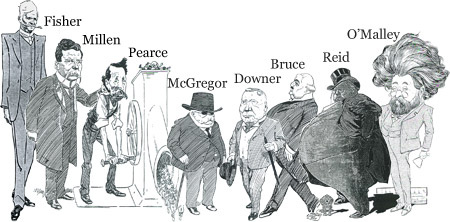The members of the Australian Parliament assembled for the first time in Melbourne on 9 May 1901. One hundred and eleven members, comprising 36 senators and 75 members of the House of Representatives, had been elected in polls held in all states on the 29th or 30th March.
Some of these men were already well-known in their states or Australia-wide, while others made names for themselves in the first years of the Commonwealth. A number were virtually unknown at the time of the first election, and have now faded from public memory.
The members of the first Parliament were all men. Although women were eligible to stand for election in South Australia, no woman did stand for federal Parliament until the election of 1903.
The members of the first Commonwealth Parliament included some of the most prominent men in Australia at that time. Between them, they had a wealth of political experience. A considerable number were ‘founding fathers’, having participated in the framing of the Constitution, and having led Australia to federation. Ten had been at the National Australasian Convention of 1891, and 25 at the 1897/8 Convention.
Of the 111 members of the first Parliament, 87 had previously served in a colonial parliament (29 senators and 58 members of the House of Representatives). Fourteen of these had been colonial premiers. Four serving premiers—Lyne (NSW), Holder (SA), Turner (Vic.) and Forrest (WA) resigned their positions to take up places in the first Commonwealth Parliament.
The men of the first Parliament continued to lead Australia for almost a quarter of a century. Every prime minister up to 1923 had been a member of the first Parliament.
THE TYPICAL FIRST PARLIAMENTARIAN WAS BORN IN AUSTRALIA, WAS AGED AROUND 48, AND WAS LIKELY TO BE A LAWYER WHO HAD SERVED IN A COLONIAL PARLIAMENT

Where did they come from?
Fifty-seven of the first members were born in Australia. Only three were born in Queensland and just one man, Sir John Forrest, was born in Western Australia.
Of those born overseas, 26 were born in England or Wales, 17 in Scotland and seven in Ireland. Only four were born outside Australia or the British Isles. James Cook was born in New Zealand, and Senator Simon Fraser was born in Nova Scotia, Canada. There is doubt about the remaining two: John Christian Watson was reputedly born in Valparaiso, Chile. King O’Malley claimed to have been born in Canada, but was probably born in the USA. If these two members of the House of Representatives were not in fact British subjects they were technically ineligible to sit in the Parliament.
The average age of the first parliamentarians was 48 (50 in the Senate and 47 in the House of Representatives). The oldest, at 71 years and 9 months, was Sir Edward Braddon, and the youngest was Senator Keating, of Tasmania, who was 28.
The length of their service varied from four months (William Henry Groom) to 51 years (William Morris Hughes).
They were drawn from a wide range of social backgrounds, education and occupations. Twenty-eight were lawyers, but they also included labourers, tradesmen, union officials, journalists, farmers, a clergyman, and a doctor.
Backbench parliamentarians in 1901 received a salary of 400 pounds per year. While they were entitled to free rail travel throughout Australia, initially they had no entitlement to free travel by sea, or to allowances to cover the expense of accommodation or food while attending Parliament. Their families were not entitled to any travel expenses or allowances.
Serving in the first Parliament created financial difficulties for many of the first members. The great majority were not wealthy men. It is probable that a number left the Parliament poorer than when they entered it.
Images taken from:
Caricatures by Low. Tyrell's Ltd, Sydney, 1915
The Bulletin (Sydney), 18 June 1898, 22 September 1900, 9 February 1901
and 18 May 1901
Australasian, 26 February 1898
O'Malley by Hal Gye, National Library of Australia
|


